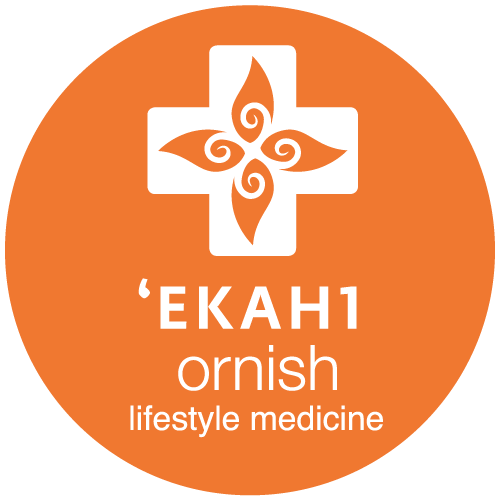
Shelley’s Story
Career: Nursing Professional with 20 Years Experience
I’d been having some health problems – I knew I had high blood pressure, but this time things turned scary because I began to lose my eyesight. My doctors told me I had pseudotumor cerebri, and that I needed to lose weight soon or risk losing my eyesight permanently. I started gathering doctors left and right – I had a rheumatology consult, a neurology consult – and they told me I was going to have a stroke or a heart attack by the time I turned 40. I’m 38. And I’m a nurse, so it wasn’t like I thought I knew better than the doctors, but I was doing the best I could. I’m Hawaiian, so I always knew I had a higher risk for stroke and heart disease, but I never knew where to start.
I submitted an inquiry to the ‘Ekahi Ornish program online. I was scared, but determined. As a nurse, I’d taken care of patients with complicated health problems related to heart disease – patients with children the same age as my own. And I knew that if I was going to do the program, I was going to give it my full competitive spirit. But the exercise physiologist Lily wanted us to write down realistic goals for ourselves. So I wrote down small stuff – I wanted to get off my blood pressure medications, and I wanted to get out of the 200 pound club. When I finally got out, I was so happy I cried with the ‘Ekahi staff. I knew I was never going to be in that club again.
My physician was surprised too. Before I started the program, I was at risk for metabolic syndrome and pre-diabetes, and I had a high triglyceride count and cholesterol level. When he came back with the charts after I’d finished, he told me my results were normal. I said “you’re kidding me!” He said “it’s true!”. I’m still on my blood pressure medication, but the dosage is much lower than before. He’s weaning me off the medication for the swelling in my head as well.
I think the biggest benefit of the program is the things you learn. Before starting the program, I didn’t realize how un-creative American fast food was – it’s too easy to go down the street and pick up a burger from McDonalds. Now I make my own healthy dishes at home – for our potluck, I made a Portobello mushroom that tasted just like pot roast.
And though my husband and kids haven’t stopped eating meat – our meals have gotten healthier thanks to my cooking. My husband says he’s eating more vegetables now than he’d ever eaten before in his whole life. My kids are supportive as well – we went to a Subway, and the person behind the counter kept asking me which meats I wanted. My 7 year old gave an exasperated sigh and said “my mom doesn’t eat meat!”
But for me, the diet was the last thing I was worried about. I didn’t think the cohort style would work for me because I’m not a joiner. I was worried that I’d never associate with my cohort too – I’m young, and I’m from the valley in Maui. My cohort members stood in stark contrast to me – we even had a 70 year old working professional and another participant in her twenties. I decided I’d sit through the group sessions without saying a word. But after the first session, I almost broke down. I realized despite our differences we’d all come here for the same reason – and that I needed this support group more than anything. Now they’re in my phone as Ornish Ohana, and I text them all the time. Our group facilitator May told us that Group Support exists for a reason – you can’t make these changes alone. It’s the best part of the program.
If you’re thinking about starting, my advice is to be patient with yourself. Lifestyle changes don’t happen overnight. Come with realistic goals and an open mind. If lifestyle changes were easy, we’d all be doing them on our own. I came because I refused to let my diagnosis drive me crazy. But instead, I made lifelong connections that I never thought I’d experience as an adult.
